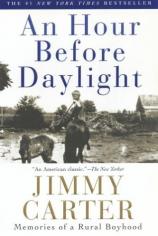An Hour Before Daylight: Memories of a Rural Boyhood
Review
An Hour Before Daylight: Memories of a Rural Boyhood
When Jimmy Carter ran for reelection in 1980, I was a lowly
fifth-grader who wanted the chance to vote for him. By my youthful
reckoning he seemed fair and earnest, and it didn't hurt that he
was from Georgia, which was pretty close to my hometown in SC. And
while I'm sure Democrats big and small were severely disheartened
when he lost, I get some solace from his role as our nation's
unofficial ambassador to poor and disenfranchised people the world
over.
AN HOUR BEFORE DAYLIGHT, a memoir of his Georgia boyhood, sheds
light on why a man who rose so high still travels among people our
society often treats as too low for consideration. Most older
Americans (you know, 30+) know that Carter grew up in the small
town of Plains, Georgia, joined the Navy and became governor of his
home state before becoming Commander-In-Chief. But as time passes,
many Southerners are at least a generation away from the kind of
farm and rural life he lived. Fewer still are around who actually
count days beginning before daylight as part of their childhood.
Carter's latest work, subtitled Memories of a Rural Boyhood, is
most noteworthy as a record of Southern family life in the first
half of the last century.
The elements that make AN HOUR BEFORE DAYLIGHT worthwhile are his
tales of how land and place shaped his early life, relationships
between whites and blacks across the South's racial divide, and the
record of how a rural farm family produced a president and world
leader.
Carter begins with a list of rivers one crosses from Savannah to
Plains, originally known as Plains of Dura. It is the kind of
knowledge and connection with the earth that was so necessary and
ordinary in his boyhood and is rare in contemporary times. As a
boy, and a man, Carter knew where to fish for what, how to
cultivate the earth for food and income, and what it takes to
survive in southern woodlands. (I'd take him as my guide over a
"Survivor" contestant any day.) Reading his tales of farm living
make it seem like a very difficult path, with few creature
comforts. Yet the rewards of a close-knit, self-sufficient family
and small pleasures are so much greater when there's no inundation
of images of what you should want.
Carter shows how homespun pleasures like divinity candy or
church-sponsored parties brought joy to his childhood. Over and
over I found myself saddened at our current dependence on indoor
and manufactured pursuits and pleasures. Who do you know who can
name local birds and topography and bring dinner from the
woods?
In Carter's boyhood pursuits he makes it clear that his closest
companions were the black families on the family farm. And while he
angled for his father's tutelage and approval, Jack Clark, a black
man who worked for the Carters, taught the boy many of his lessons
in farming. In the first pages of the memoir, his descriptions of
relations between whites and blacks seem overdone, as if he's
overcompensating and providing a PC version of events. The truth is
that the Carters lived within and abided by segregation but did not
join in being cruel to blacks. And rather than relegating
descriptions of Jack Clark and others to a few pages, Carter
returns to them again and again, as they were a part of his daily
life throughout his boyhood. By the end of AN HOUR BEFORE DAYLIGHT
it is clear that he had genuine respect and love for those black
families. Carter shows how much more intimate, though patriarchal,
white and black relations were during his childhood.
Jimmy Carter will always stand out because of his history and his
important work even after his term as president. His efforts around
the world should come as no surprise after reading AN HOUR BEFORE
DAYLIGHT. He rose to the presidency not from a life of wealth and
privilege, but from the simple, rural setting of a Georgia farm.
And while he still travels a great deal, he has made Plains his
home base --- and that speaks volumes in a time when we often
disparage small towns and rural places. Carter's boyhood tales show
us how a compassionate man was raised and why the family farm is a
place to which he chose to return.
Reviewed by Bernadette Davis on January 22, 2011
An Hour Before Daylight: Memories of a Rural Boyhood
- Publication Date: October 16, 2001
- Genres: Nonfiction
- Paperback: 288 pages
- Publisher: Simon & Schuster
- ISBN-10: 0743211995
- ISBN-13: 9780743211994




